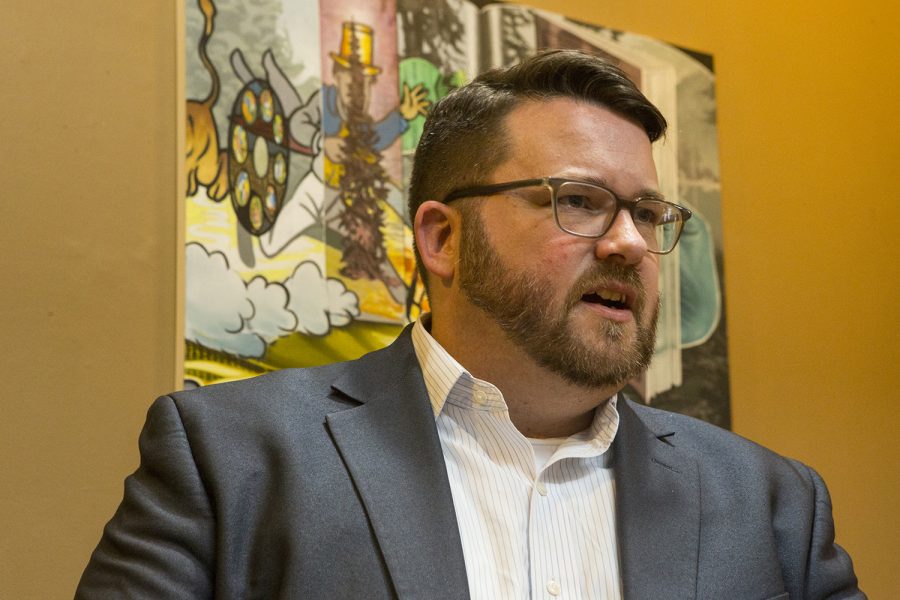Iowa Democratic Party chair predicts 2020 caucuses to be best-attended in history
After the applications for satellite caucuses were released this month, the Iowa Democratic Party Chair told The Daily Iowan the party is working to improve accessibility and increase participation, countering complaints of restrictions.
Iowa Democratic Party Chair Troy Price discusses the Iowa caucuses in an interview for The Daily Iowan at Prairie Lights on Friday, May 5, 2019. (Jenna Galligan)
October 30, 2019
Iowa Democratic Party Chair Troy Price predicts the 2020 caucuses will be the best-attended in the party’s history, he said in an interview with The Daily Iowan Oct. 25.
With less than 100 days before the Iowa caucuses, the Iowa Democratic Party is working on ways to increase participation at the 2020 caucuses and make them more accessible, which Price expects to lead to higher turnout.
The Iowa caucuses have long faced criticism that they aren’t accessible and discourage participation. In 2008, the highest turnout year for the Democratic caucus, 16 percent of eligible Iowa voters participated in the caucuses while 54 percent of New Hampshire voters participated in the state’s primary elections the same year.
One major change coming to the 2020 caucuses is the addition of satellite caucuses, or caucuses that will be held outside of the regular precinct sites, including out-of-state and international locations where there is a high number of Iowa residents. The Iowa Democratic Party opened applications, which are available on its website, for satellite caucuses Oct. 18.
The application asks for detailed information about the potential site, including Wi-Fi availability, numbers of tables and chairs, and parking availability. The form also includes a section affirming if the site meets Americans with Disabilities Act compliance requirements.
The state party originally planned to have a virtual-caucusing option where people could indicate their preference by phone, but the Democratic National Committee rejected those plans in August because of security concerns.
Price said the satellite caucuses will expand participation and bring people usually unable to caucus into the process.
“We don’t know exactly what the turnout is going to look like until we see what the applications are that are coming in,” Price said. “But I’m confident that this process will capture some of those folks that wouldn’t otherwise be able to get there.”
Anne Matte, the communication and voting-outreach coordinator for Disability Rights Iowa, said she has concerns around the efficacy of the satellite caucus in increasing participation among people with disabilities.
Matte said the satellite-caucus application is too vague and doesn’t clearly outline expectations for hosting a caucus or what would disqualify an applicant. The application itself can also be difficult to fill out for people with disabilities, she said.
In the interview, Price said the factors that will influence a site’s approval are still in discussion.
“This is the first time we’ve done it, especially at this scale,” Price said. “And so we’re waiting, I think a lot of it will just depend on what the applications look like when they come in.”
Another major concern of Disability Rights Iowa is that the Iowa Democratic Party has not yet hired a DNC-mandated accessibility director or accessibility organizers. Price said the party is in the process of hiring the disability staff and will be involved in reviewing applications.
“Let’s get going. Let’s get this caucus accessibility director hired,” said Jane Hudson, the executive director of Disability Rights Iowa. “We’re now only three months to the caucuses. And there really does need to be a written process for looking at the request for the satellite caucuses… We don’t know why they’re dragging their feet.”
Price said the party is in talks with public transit and other transportation organizations around the state to facilitate rides to caucus sites. The party is also ensuring each caucus site is ADA accessible and makes changes when needed.
The party has a request-for-accommodation form available for people who need special requests as well, which will allow people to request resources such as American Sign Language interpreters and closed captions.
“We really do think these are going to be our best caucuses yet,” Price said. “Our highest turnout was 239,000 back in 2008. Right now, I think we’ll exceed that. By how much, we don’t know yet.”



